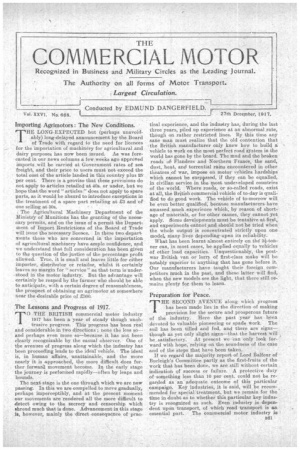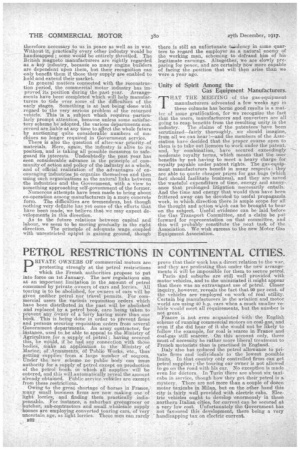Importing Agrimotors: The New Conditions. •
Page 1

Page 2

If you've noticed an error in this article please click here to report it so we can fix it.
THE LONG-EXPECTED but (perhaps unavoidably) long-delayed announcement by the Board of Trade with regard to the need for licences for the importation of machinery for agricultural and dairy purposes has now been iSsued. As was forecasted in our news columns a few weeks ago approved imports will be 'carried at Government rates of sea freight, and their price to users must not exceed the total cost of the article landed in this country plus 25' per cent. There is a proviso that these provisions do not apply to articles retailed at 40s. or under, but we hope that the word " articles" does net apply to spare parts, as it would be absurd to introduce exceptions in the treatment of a spare part retailing at 23 and of' one selling at 30s.
. The Agricultural Machinery Department of the Ministry of ,Munitions has the granting of the necessary permits, and on the issue of a permit the Depart-, ment of Import Restrictions ,of the Board of Trade will issue the necessary licence. In these two depart vents those who are concerned in the importation of agricultural machinery have ample confidence, and we understand that full consideration has been given to the question of the justice of the percentage profit . allowed. True, it is small and leaves little for either importer, distributor or retailer, whilst it certainly leaves no margin for " service" as that term is under-stood in the motor industry. But the advantage will certainly be reaped by the farmer who should be able to anticipate, with a certain degree of reasonableness, the prospect of obtaining an agrinaotor at somewhere near the desirable price of 2300.
The Lessons and Progress of 1917.
T. THE BRITISH commercial motor industry 1917 has been a year of steady though unobtrusive progress. This progress has been real and considerable in two directions ; none the less so— and perhaps even more so—because it has not been clearly recognizable by the casual observer. One of the avenues of progress along which the industry has been proceeding leads to the ideal vehicle. The ideal is, in human affairs, unattainable, and the more nearly it is approached, the more difficult does further forwara movement become. In the early stage the journey is performed rapidly—often by leaps and hounds.
The next stage is the one through which we are now passing. In this we are compelled to move gradually, perhaps imperceptibly, and at the present moment our movements are rendered all the more difficult to detect owing to the secrecy and censorship which shroud much that is done. Advancement in this stage is, however, mainly the direct consequence of prac tical experience, and the industry has, during the last three years, piled .up experience at an abnormal rate, though on rather restricted lines. By this time any sane man must realize that the old contention that the British manufacturer only knew how to build a vehicle to work on the most perfect road Ystem in the world has gone by the board. The mud and the broken roads' of, Flanders and Northern France, the sand, dust,.heat, and torrential rains encountered in other . theatres of war, impose on motor v,ehieles hardships which cannot be surppsed, if they can be equalled, in civilian service in the most undeveloped countries of the .world. Where roads, or so-called roads, exist. at all, the British commercial vehicle of to-day is qualified to do good work. The vehicle of to-morrow will be' even better qualified;.beeause manufacturers have amassed much ,experience .which, by reason of shortage of materials, or for other causes, they cannot yet apply. Some developMents must be tenta,tive at first, and experiments cannot ,and should not be tried when the whole output is concentrated strictly upon one model, many lives depending. upon its reliability. What has been learnt almost entirely on the 3i-ton-. ner can, in most eases, be applied equally to vehicles of other load capacities. Unquestionably, the postwar British van or lorrs ,of first-class make will be notably superior to anything that has gone before it. Our manufacturers have taught their .foreign. competitors much in the past, and these latter will find, when the new models see the light, that there still remains plenty for them to. learn.
Preparation for Peace. .
THE SECOND AVENUE along, which progress has been made lies in the direction of making provision for the secure and prosperous future 'of the industry. 'Here the past year has been devoted to valuable pioneering or spade work. The soil has been tilled and fed, and there are signs— though as yet only slight signs—that the harvest will be, satisfactory. At present we ban only look forward with hope, relying on the soundness of the case and of the steps that have been taken. If we regard the majority report of Lord Balfour of I3urleigh's Committee partly as the first-fruits of the work that has been done, we are still without certain indication of success or failure. A protective duty of-something less than 10 per cent. could not be regarded as' an adequate outcome of this particular campaign. Key industries, it is said, will be recommended for special, treatment, but we remain for the ' time in doubt as to Whether this particular key industry is recognized as such. Even industry is dependent upon transport, of which' road transport is an essential part. The commercial motor industry is . therefore necessary to us in peace as well as in war Without it, practically every other industry would be handicapped; some would be entirely throttled. The British magneto manufacturers are rightly regarded as a keY industry, because so many engine builders are dependent upon them, but their recognition can only benefit them if those they supply are enabled to held and extend their market.
In general matters connected with the recon,strue tion period, the commercial motor industry has im proved-its position during the past year. Arrangements have been completed which will help man-a-fat threes to tide over some of the difficulties of the early stages. Something is at last being done with regard to the very serious problem of the returned vehicle. This is a subject which requires particularly prompt attentiont, because unless some satisfac tory scheme be adopted, the various departments concerned arelia,ble at any time to affect the whole future by auctioning quite consideraille nunibers of machines no longer required in Government service.
There is also the question of after-war priority of materials. Here, again, the industry is alive to its position, and is taking all possible Measures to safeguard its interests. Undoubtedly the past year has seen considerable advance in the principle of community of action and policy of the industry as a whole, and of official realization of the advantages Of encouraging industries to organize themselves and then using such organizations as the natural links between the industries and the Government, with a view to something approaching self-government of the former. Numerous attempts have been made to bring about co-operation among manufacturers in a more concrete form. The difficulties are tremendous, but though nothing very definite has yet come of the efforts that have been made, we believe that we may expect de velopments in this direction.
As to the future relations between capital and labour, we seem to be moving gradually in the right direction. The principle of adequate wage coupled with unrestricted optput is gaining ground, though there is still an unfortunate tkaadency in some quarters to regard the employer as a natural enemy of the working man, scheming to defraud him of his legitimate earnings. Altogether, we are slowly preparing for peace, and are certainly now more capable of facing the position that will then arise than •we were a year ago.
Unity of Spirit Among the Gas Equipment Manufacturers.
THAT THE MEETING of the gas-equipment manufacturers advocated a few weeks ago in these celumns has borne good results is a matter of some gratification, for we recognize the fact that the users, manufacturers and converters are all going to reap benefits from the resulting unity in the industry. The claims of the patentees have been scrutinized—fairly thoroughly, we should, imagine, from all we can hearl—and the members of the Association have decided that the proper course open to them is to take out licences to work under the patent, and, by combination, have secured exceedingly moderate royalty terms, which means that the user benefits by not having to meet a heavy charge for royalty payable under patent rights. The gas-equipmeat manufacturers benefit in many respects : they are able to quote cheaper prices for gas bags (which fact should facilitate business), and they are saved the wasteful expenditure of time, energy. and annoyance that prolonged litigation necessarily entails. And the time and energy that would thus have been frittered away can be devoted to useful propaganda work, in which,direction there is ample scope for all the thought and action 1,vaicli can be brought to bear on the subject. Useful evidence can be laid before the Gas Transport Committee, and a claim be put forward for representation on that committee, and this will probably constitute the next task .of the Assotiation. We wish success to the new Moter.Gas Equipment Association.
























